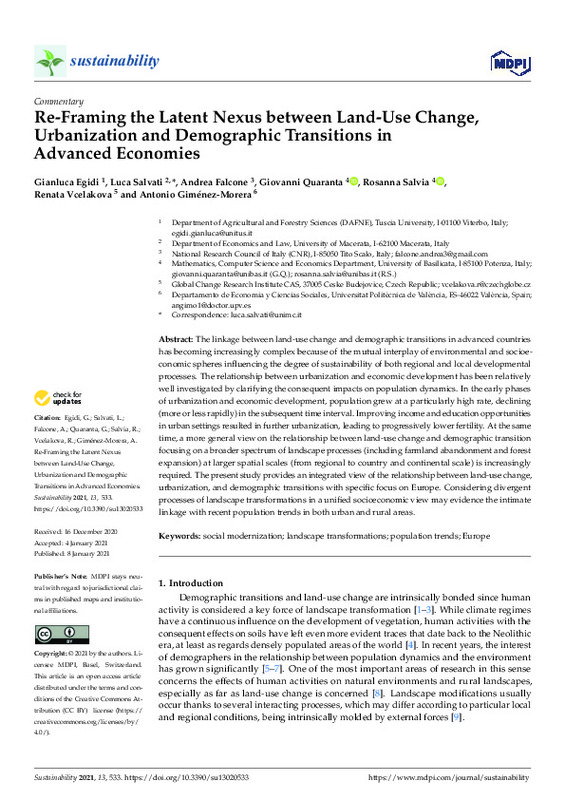JavaScript is disabled for your browser. Some features of this site may not work without it.
Buscar en RiuNet
Listar
Mi cuenta
Estadísticas
Ayuda RiuNet
Admin. UPV
Re-Framing the Latent Nexus between Land-Use Change, Urbanization and Demographic Transitions in Advanced Economies
Mostrar el registro sencillo del ítem
Ficheros en el ítem
| dc.contributor.author | Egidi, Gianluca
|
es_ES |
| dc.contributor.author | Salvati, Luca
|
es_ES |
| dc.contributor.author | Falcone, Andrea
|
es_ES |
| dc.contributor.author | Quaranta, Giovanni
|
es_ES |
| dc.contributor.author | Salvia, Rosanna
|
es_ES |
| dc.contributor.author | Vecenakova, Renata
|
es_ES |
| dc.contributor.author | Giménez Morera, Antonio
|
es_ES |
| dc.date.accessioned | 2022-05-09T18:04:49Z | |
| dc.date.available | 2022-05-09T18:04:49Z | |
| dc.date.issued | 2021-01 | es_ES |
| dc.identifier.uri | http://hdl.handle.net/10251/182449 | |
| dc.description.abstract | [EN] The linkage between land-use change and demographic transitions in advanced countries has becoming increasingly complex because of the mutual interplay of environmental and socioeconomic spheres influencing the degree of sustainability of both regional and local developmental processes. The relationship between urbanization and economic development has been relatively well investigated by clarifying the consequent impacts on population dynamics. In the early phases of urbanization and economic development, population grew at a particularly high rate, declining (more or less rapidly) in the subsequent time interval. Improving income and education opportunities in urban settings resulted in further urbanization, leading to progressively lower fertility. At the same time, a more general view on the relationship between land-use change and demographic transition focusing on a broader spectrum of landscape processes (including farmland abandonment and forest expansion) at larger spatial scales (from regional to country and continental scale) is increasingly required. The present study provides an integrated view of the relationship between land-use change, urbanization, and demographic transitions with specific focus on Europe. Considering divergent processes of landscape transformations in a unified socioeconomic view may evidence the intimate linkage with recent population trends in both urban and rural areas. | es_ES |
| dc.language | Inglés | es_ES |
| dc.publisher | MDPI AG | es_ES |
| dc.relation.ispartof | Sustainability | es_ES |
| dc.rights | Reconocimiento (by) | es_ES |
| dc.subject | Social modernization | es_ES |
| dc.subject | Landscape transformations | es_ES |
| dc.subject | Population trends | es_ES |
| dc.subject | Europe | es_ES |
| dc.subject.classification | COMERCIALIZACION E INVESTIGACION DE MERCADOS | es_ES |
| dc.title | Re-Framing the Latent Nexus between Land-Use Change, Urbanization and Demographic Transitions in Advanced Economies | es_ES |
| dc.type | Artículo | es_ES |
| dc.identifier.doi | 10.3390/su13020533 | es_ES |
| dc.rights.accessRights | Abierto | es_ES |
| dc.contributor.affiliation | Universitat Politècnica de València. Departamento de Economía y Ciencias Sociales - Departament d'Economia i Ciències Socials | es_ES |
| dc.description.bibliographicCitation | Egidi, G.; Salvati, L.; Falcone, A.; Quaranta, G.; Salvia, R.; Vecenakova, R.; Giménez Morera, A. (2021). Re-Framing the Latent Nexus between Land-Use Change, Urbanization and Demographic Transitions in Advanced Economies. Sustainability. 13(2):1-17. https://doi.org/10.3390/su13020533 | es_ES |
| dc.description.accrualMethod | S | es_ES |
| dc.relation.publisherversion | https://doi.org/10.3390/su13020533 | es_ES |
| dc.description.upvformatpinicio | 1 | es_ES |
| dc.description.upvformatpfin | 17 | es_ES |
| dc.type.version | info:eu-repo/semantics/publishedVersion | es_ES |
| dc.description.volume | 13 | es_ES |
| dc.description.issue | 2 | es_ES |
| dc.identifier.eissn | 2071-1050 | es_ES |
| dc.relation.pasarela | S\425315 | es_ES |








